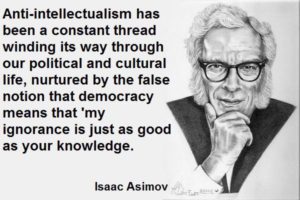
As a philosophy professor I often am called upon to defend my discipline. When it comes to the media and any examples of “useless humanities,” philosophy ranks way up there, probably along with comparative literature and art. As colleges around the country tighten their belts and work hard to justify the high cost of higher education (a genuine concern but consider what drives up the cost…), the first departments to be chopped off are the liberal arts, the humanities in particular. After all, “what are you going to do with a degree in philosophy?” Academic departments are asked to complete a PPR, “Program Prioritization Report“–admin-speak for justify your existence in terms of quantifiable numbers or else.

Ralph Waldo Emerson
Now much of this rhetoric against the humanities is fueled by administrators in two camps: those who have but a nodding acquaintance with anything beyond business subjects and those whose entire college education was composed of the subjects that they are rushing to condemn as useless. It reminds me of the Transcendentalists in 19th century America who scoffed at European values and especially a classical education and used the very language of that education to do so. While they may have been making some good points about authoritarianism and rigid thinking, many of their ideas became the foundation for an anti-intellectualism that we still see thriving in our country today.
OK, all that aside, in a world where college = job training, how does one defend the humanities? Majoring in accounting, hospitality and tourism, nursing, computer science clearly signals a paying job at the end. However, this kind of thinking is driven by a mid-twentieth century notion of career: one majors in x and works in X for the next 45 years, retiring as the CEO of a X-firm with that gold watch. Hmm… not the way it works any  more, folks. Most of our young people will change careers many times in their lives and work in jobs and careers that do not even exist today. Imagine being in college in the 70s and now working in the IT industry. Oh wait, you do. What did you major in? Chances are it was not Social Media or even Programming. To do the business community credit, most companies will clearly say that they want young employees who can write, speak and think creatively–regardless of their major. In fact, most corporations will train their new employees as they want them to be trained. They do not want the business majors whose thinking has been shaped by their 50-60 year old profs. But all of this has missed the ears of anxious parents (and yes, the cost of college is worrisome), college administrators hoping to lure more students to enroll, and government officials. They stick with the script that college’s duty is to train workers.
more, folks. Most of our young people will change careers many times in their lives and work in jobs and careers that do not even exist today. Imagine being in college in the 70s and now working in the IT industry. Oh wait, you do. What did you major in? Chances are it was not Social Media or even Programming. To do the business community credit, most companies will clearly say that they want young employees who can write, speak and think creatively–regardless of their major. In fact, most corporations will train their new employees as they want them to be trained. They do not want the business majors whose thinking has been shaped by their 50-60 year old profs. But all of this has missed the ears of anxious parents (and yes, the cost of college is worrisome), college administrators hoping to lure more students to enroll, and government officials. They stick with the script that college’s duty is to train workers.
So, what can anyone do to defend the humanities in ways that does not simply look rantings from self-serving luddites? I hate to use a generation of college students as guinea pigs so as to say in 10 years, “we told you so.” Some research minded colleagues at the Daily Nous blog (extra points for the great title, right?) are working on collecting data and reasoned arguments so as to provide philosophy–and other humanities–with some ways to argue  for the continuing value of the liberal arts. And in a country that is skewing more and more towards ignorance, this may be the needed wake up call. So, let’s stop and think about the value of philosophy, but not only in terms of those data-driven mandates, but really–what kind of life do you want to live? What values matter? How do you determine truth from ‘truthiness’ or falsity? Who are you and how can you create a meaningful life? These are some of the fundamental philosophical questions that every human grapples with. Oh, and yes, thinking philosophically can help you get that job if you can present a clear argument and listen carefully to objections. And to end with words of wisdom from Steven Wright:
for the continuing value of the liberal arts. And in a country that is skewing more and more towards ignorance, this may be the needed wake up call. So, let’s stop and think about the value of philosophy, but not only in terms of those data-driven mandates, but really–what kind of life do you want to live? What values matter? How do you determine truth from ‘truthiness’ or falsity? Who are you and how can you create a meaningful life? These are some of the fundamental philosophical questions that every human grapples with. Oh, and yes, thinking philosophically can help you get that job if you can present a clear argument and listen carefully to objections. And to end with words of wisdom from Steven Wright:
I was in a job interview and I opened a book and started reading. Then I said to the guy, “Let me ask you a question. If you are in a spaceship that is traveling at the speed of light, and you turn on the headlights, does anything happen?” He said, “I don’t know.” I said, “I don’t want your job.”










